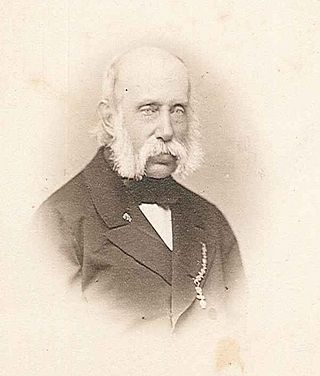Top Qs
Timeline
Chat
Perspective
Archduke Franz Karl of Austria
Austrian archduke (1802–1878) From Wikipedia, the free encyclopedia
Remove ads
Archduke Franz Karl Joseph of Austria (17 December 1802 – 8 March 1878) was a member of the House of Habsburg-Lorraine. He was the father of two emperors: Franz Joseph I of Austria and Maximilian I of Mexico. Through his third son Karl Ludwig, he was the grandfather of Archduke Franz Ferdinand of Austria – whose assassination sparked the hostilities that led to the outbreak of World War I.
Remove ads
Life
Summarize
Perspective
Early life and marriage
Franz Karl was born in Vienna, the third son of Emperor Francis II of the Holy Roman Empire by his second marriage with Princess Maria Theresa from the House of Bourbon, daughter of King Ferdinand I of the Two Sicilies and Maria Carolina of Austria. On 4 November 1824 in Vienna, he married Princess Sophie of Bavaria from the House of Wittelsbach, a daughter of King Maximilian I Joseph of Bavaria by his second wife Caroline of Baden. Sophie's paternal half-sister, Caroline Augusta of Bavaria was by this time Franz Karl's stepmother, having married his thrice-widowed father in 1816. The Wittelsbachs condoned the unappealing manners of Sophie's husband in consideration of the incapability of his elder brother Ferdinand and Sophie's chance to become Austrian empress.

Franz Karl was an unambitious and generally ineffectual man, although he was, together with his uncle Archduke Louis, a member of the Geheime Staatskonferenz council, which after the death of Emperor Francis II ruled the Austrian Empire in the stead of his mentally ill brother Ferdinand from 1835 to 1848. The decisions, however, were actually made by the Chancellor Prince Klemens Wenzel von Metternich and his rival Count Franz Anton von Kolowrat-Liebsteinsky. His wife Sophie had already transferred her ambitions, when she urged Franz Karl to renounce his claims to the throne at the time of his brother's abdication on 2 December 1848, allowing their eldest son Franz Joseph I to take the throne.
Death and burial
Archduke Franz Karl died in Vienna in 1878, six years after the death of his wife. He is buried at the Imperial Crypt at the Capuchin Church. Franz Karl was the last Habsburg whose viscera were entombed at the Ducal Crypt of St. Stephen's Cathedral and whose heart was placed at the Herzgruft of the Augustinian Church according to a centuries-long family rite.
Remove ads
Honors and awards
Summarize
Perspective
He received the following awards:[1]
 Austrian Empire:
Austrian Empire:
 Kingdom of France: Knight of the Holy Spirit, 5 February 1824[4]
Kingdom of France: Knight of the Holy Spirit, 5 February 1824[4] Kingdom of Bavaria: Knight of St. Hubert, 1824[5]
Kingdom of Bavaria: Knight of St. Hubert, 1824[5] Duchy of Parma: Senator Grand Cross of the Constantinian Order of St. George, with Collar, 1827[6]
Duchy of Parma: Senator Grand Cross of the Constantinian Order of St. George, with Collar, 1827[6] Kingdom of Prussia:
Kingdom of Prussia:
- Knight of the Black Eagle, 9 September 1835[7]
- Knight of the Red Eagle, 1st Class
 Baden:[8]
Baden:[8]
- Grand Cross of the House Order of Fidelity, 1835
- Grand Cross of the Zähringer Lion, 1835
 Russian Empire:[9]
Russian Empire:[9]
- Knight of St. Andrew, 1835
- Knight of St. Alexander Nevsky, 1835
- Knight of the White Eagle, 1835
- Knight of St. Anna, 1st Class, 1835
 Grand Duchy of Hesse: Grand Cross of the Ludwig Order, 30 August 1837[10]
Grand Duchy of Hesse: Grand Cross of the Ludwig Order, 30 August 1837[10] Kingdom of Hanover:[11]
Kingdom of Hanover:[11]
- Grand Cross of the Royal Guelphic Order, 1839
- Knight of St. George, 1847
 Württemberg: Grand Cross of the Württemberg Crown, 1844[12]
Württemberg: Grand Cross of the Württemberg Crown, 1844[12]
 Sweden-Norway: Knight of the Seraphim, 9 July 1850[13]
Sweden-Norway: Knight of the Seraphim, 9 July 1850[13] Kingdom of Saxony: Knight of the Rue Crown, 1856[14]
Kingdom of Saxony: Knight of the Rue Crown, 1856[14] Oldenburg: Grand Cross of Duke Peter Friedrich Ludwig, with Golden Crown, 13 July 1858[15]
Oldenburg: Grand Cross of Duke Peter Friedrich Ludwig, with Golden Crown, 13 July 1858[15]

 Ernestine duchies: Grand Cross of the Saxe-Ernestine House Order, February 1859[16]
Ernestine duchies: Grand Cross of the Saxe-Ernestine House Order, February 1859[16] Empire of Brazil: Grand Cross of the Southern Cross
Empire of Brazil: Grand Cross of the Southern Cross Brunswick: Grand Cross of Henry the Lion
Brunswick: Grand Cross of Henry the Lion Kingdom of Greece: Grand Cross of the Redeemer
Kingdom of Greece: Grand Cross of the Redeemer Grand Duchy of Tuscany: Grand Cross of St. Joseph
Grand Duchy of Tuscany: Grand Cross of St. Joseph Two Sicilies: Grand Cross of St. Ferdinand and Merit
Two Sicilies: Grand Cross of St. Ferdinand and Merit
Remove ads
Children
See also
Ancestors
Remove ads
References
External links
Wikiwand - on
Seamless Wikipedia browsing. On steroids.
Remove ads

